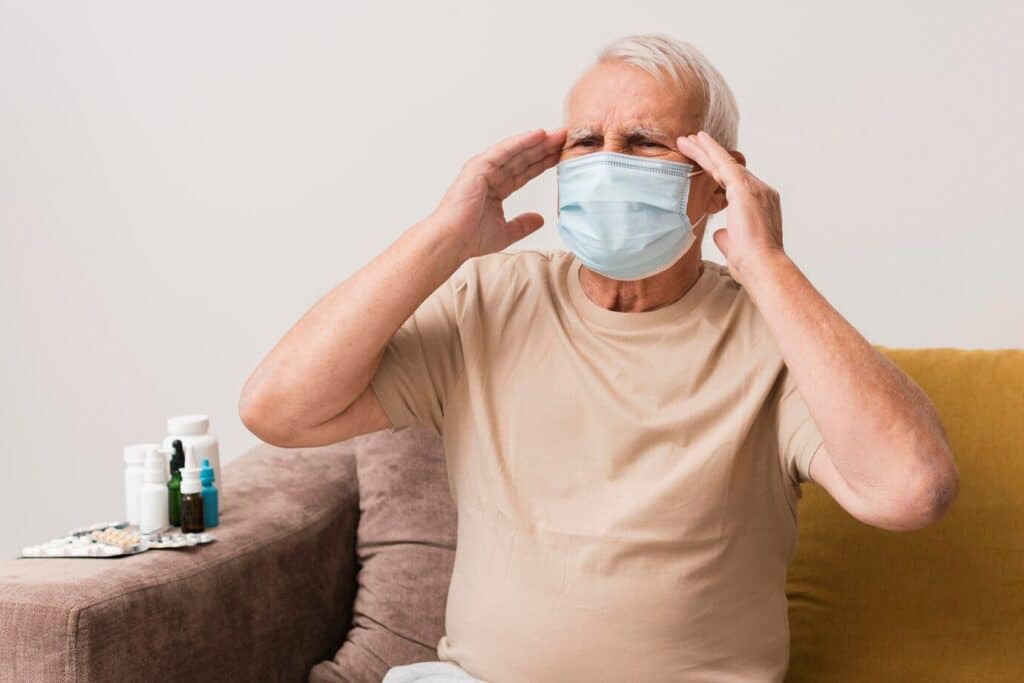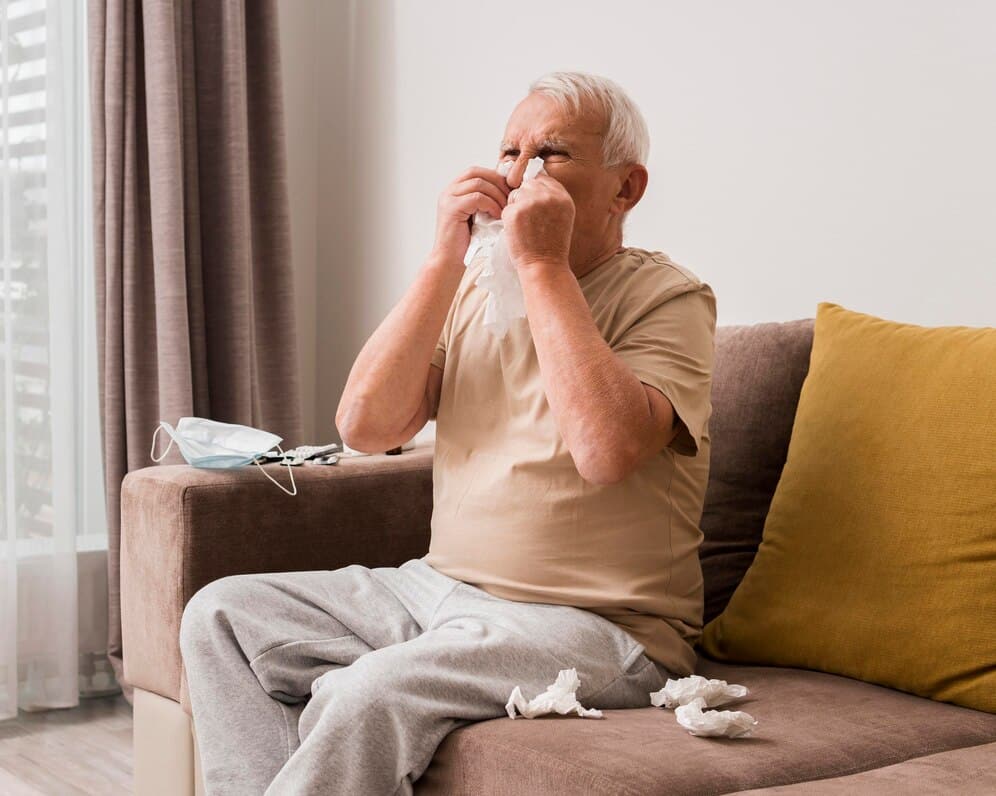Cold symptoms can significantly impact your health, especially as you age. Understanding how to recognize these symptoms and care for yourself during a cold is vital for maintaining your well-being. In this guide, you’ll discover the critical indicators of the common cold and effective remedies tailored for older adults. By arming yourself with this knowledge, you can better manage your health during the cold season and minimize complications that may arise from seemingly mild infections. Let’s examine the imperatives of navigating common cold symptoms and care for older adults.
Key Takeaways:
- Cold Symptoms in older adults can lead to severe complications, so it’s necessary to recognize them early. Common signs include congestion, runny nose, sore throat, and mild cough.
- Treatment Approaches for the common cold focus on symptom relief rather than a cure. Rest, hydration, and over-the-counter medications can alleviate discomfort.
- Prevention Strategies are vital in reducing cold transmission. Effective measures include regular hand washing, avoiding close contact with sick individuals, and maintaining cleanliness in living spaces.
For more information or to speak with a professional, contact Lakeview Senior Living at 541-994-7400 in Lincoln City, OR.
Are Colds Worse for Older People?
The common cold can be particularly concerning for older adults. As you age, your body’s ability to effectively fight off infections diminishes, making you more vulnerable to respiratory illnesses. Even a mild cold can lead to severe complications like pneumonia, especially if you have existing chronic conditions. This heightened risk underscores the importance of recognizing common cold symptoms early and taking necessary precautions to safeguard your health.
Physiological Changes in Aging
As you age, your body undergoes various physiological changes that can affect overall health. These include reduced lung capacity, decreased circulation, and slower metabolic processes, all contributing to your body’s reduced ability to combat infections. As a result, what may seem like an ordinary cold to a younger person can quickly escalate into a more serious health issue for you?
Impact on Immune Response
An older adult’s immune response is typically weaker than in younger adults, leading to a higher likelihood of complications from common illnesses. Your immune system may not react as efficiently, resulting in prolonged recovery and increased susceptibility to more severe symptoms.
To further emphasize the impact of aging on immune response, you should know that your immune system has fewer T cells and a diminished ability to produce antibodies. This decline means your body might struggle to recognize and combat viruses effectively, leading to an elevated risk of experiencing intense common cold symptoms. It’s essential to be proactive in monitoring your health and seeking medical advice if you notice the symptoms of a common cold, as timely intervention can help mitigate risks.
What Level of Care Do You Need?
Discover the level of care you or your family member requires.
How to Tell the Flu from the Common Cold
Differentiating between the flu and a common cold is critical to managing your health effectively. While both conditions share several symptoms, the flu typically presents with a sudden onset of fever and chills. In contrast, cold symptoms develop gradually and are generally milder. The flu is more likely if you experience severe fatigue and muscle aches. Being aware of these differences can help ensure you receive appropriate care.
Key Differences in Symptoms
Behind the seemingly similar symptoms lies a distinct difference in severity and onset. Cold symptoms, such as a runny nose or mild cough, tend to emerge more slowly, while flu symptoms can hit you suddenly with high fever and intense body aches. Understanding these differences allows you to assess your well-being more accurately and take necessary precautions.
When to Seek Medical Attention
Seek medical advice immediately if you notice symptoms worsening or experiencing high fever, shortness of breath, or failure to improve within a week. Cold symptoms can quickly escalate for older adults, making it vital to act early. Contact your physician to discuss any troubling signs.
From persistent high fever to overwhelming fatigue, recognizing when to consult a healthcare professional is essential for your safety. If symptoms such as difficulty breathing or chest discomfort occur, do not hesitate to seek medical assistance. Remember that your immune system may not respond as effectively as once, making timely intervention crucial to avoid complications, especially for seniors. In Lincoln City, you can connect with healthcare professionals at Lakeview Senior Living by calling 541-994-7400 for more support and guidance on handling common cold symptoms.
Common Cold Symptoms in Older Adults
Unlike younger individuals, older adults may experience more severe symptoms of the common cold, which can lead to complications. Symptoms such as congestion, a runny nose, and a cough can escalate quickly, so it’s vital to be vigilant. You can read more about the Common cold: Diagnosis and treatment for a deeper understanding.
Recognizing Symptoms
Most adults experience two to four colds per year. The symptoms might manifest more acutely in older adults, including severe congestion, persistent cough, and fatigue. Being aware of these signs allows for timely interventions.

Recognizing Symptoms
Variations in Presentation
Understanding that colds can present differently can help you better identify their effects on your health. The symptoms may often overlap with conditions like the flu or COVID-19, making it vital to differentiate.
Older adults often exhibit milder cold symptoms initially, which can mislead you. However, as your immune system weakens with age, the severity of a common cold can increase quickly. Be aware that symptoms you might dismiss could lead to complications, especially if you have existing health conditions. It’s advisable to consult with your healthcare provider if you notice any persistent or worsening symptoms.
The Best Cold Remedies for Older Adults
Once again, when facing a common cold, finding effective remedies that suit your needs is imperative. There are no cures, but you can manage symptoms through various methods. For a comprehensive overview, check out Cold Remedies: What Works, What Doesn’t, What Can’t Hurt. Prioritize rest and hydration, as these are critical components of recovery.
Over-the-Counter Options
Around the pharmacy, several over-the-counter medications can provide symptom relief for your cold. Nonsteroidal anti-inflammatory drugs (NSAIDs), like ibuprofen or acetaminophen, can help with aches and fever. At the same time, decongestants and antihistamines can alleviate nasal congestion and sneezing. Always consult your doctor before starting any new medications.
Home Remedies and Natural Treatments
Adults often favor home remedies to combat cold discomfort, which can be gentle on your system. Simple ingredients like chicken soup are not just comfort food; studies suggest they can reduce inflammation and improve hydration. Additionally, soothing beverages like herbal tea with honey can ease throat pain. At the same time, a cool-mist humidifier can moisten dry air, helping with congestion.
Even common items in your home can help with cold symptoms. For instance, gargling salt water can soothe a sore throat, and petroleum jelly can prevent irritation around your nose. These natural treatments can complement any over-the-counter options you choose to support your recovery from cold symptoms effectively.

Home Remedies and Natural Treatments
How Can Older Adults Prevent Colds?
Not only do colds spread quickly, but they can also pose serious health risks for you as an older adult. To protect yourself, prioritize hygiene practices like frequent handwashing with soap for at least 20 seconds, especially after sneezing or coughing. Using hand sanitizer when soap isn’t available can further reduce your risk. Also, maintaining distance from those exhibiting cold symptoms and regularly disinfecting your living environment can help keep you safe during the cold season.
Lifestyle Modifications
To effectively prevent colds, you should consider lifestyle modifications that enhance your overall health. A balanced diet rich in vitamins and minerals can bolster your immune system. At the same time, regular exercise promotes good circulation and reduces stress. Staying well-hydrated is equally essential, as it keeps your mucous membranes moist and less susceptible to infections. These simple changes can significantly lower your risk of catching colds.

Lifestyle Modifications
Importance of Vaccinations
The impact of vaccines goes beyond just preventing specific illnesses; they play an essential role in reducing the severity of diseases you may contract. Vaccines help your immune system prepare for infections, making it crucial to stay updated on your seasonal flu vaccination, especially since severe cold-related complications can arise from the flu. Protecting yourself through immunizations enhances your defense against cold-related illnesses and contributes to community health by reducing the likelihood of virus transmission.
The importance of vaccinations cannot be overstated for older adults. The flu vaccine, in particular, is vital, as it lowers your risk of flu-related hospitalizations and complications that could arise from a cold. Statistics indicate that thousands of older adults succumb to pneumonia each year, often precipitated by common colds or flu. By prioritizing vaccinations, you fortify your immune defenses, enabling you to enjoy a healthier, active lifestyle.
Find Where You Belong
Dive into the vibrant life our Westmont communities have to offer.
Final Thoughts
Common cold symptoms can be more daunting for an older adult due to a potentially weakened immune system. Understanding these symptoms and caring for yourself is vital for maintaining your health and well-being. From recognizing mild indicators like congestion and a sore throat to employing effective home remedies and prevention methods, this guide empowers you to navigate cold seasons wisely. Stay informed and take proactive steps to alleviate your symptoms and enhance your recovery experience. If you would like to schedule a tour, please contact us.








